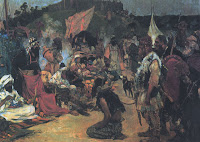
The medieval concept of power and equality was extremely different from our own. Today, we automatically know that all men were created equal, and while some people have more advantages or opportunities, they have the same worth. We all know of a history of fighting for our equality. In medieval times, this concept of equality did not exist at all. There may have been equality between the power of kings, or equality between the lowness of serfs, but no one would even think of comparing a serf to a nobleman. To the people in the middle ages, what class one was born into was the class that he stayed in his entire life. One could not choose his class, it was like it was passed down through genes. Whatever one's parent's were, that is would they would be also. Aristocrats had great power over their serfs, and they owned them like they were property. Most of the time, serfs were not treated fairly at all. One aristocrat is claimed to have done the following to his serf:
For if, as was customary, a slave held a burning candle before him at dinner, he caused his shins to be bared, and placed the candle between them until the flame died; and he caused the same thing to be done with a second candle until the shins of the torchbearer were burned. But if the slave tried to cry out, or to move from one place to another, a naked sword threatened him; and he found great enjoyment in the man's tears (Gregory of Tours).
The thought of someone doing this today astounds us, just as the thought of equality in the middle ages was foreign. As you can see, the times have changed greatly up until today, and in this case, it has been for the better.
Sources:
Harsh treatment of Serfs and Slave. Gregory of Tours. Internet Medieval Sourcebook. http://www.fordham.edu/halsall/source/575Rauching.html
Picture from:
Photograph. Wikimedia Commons. Wikipedia, 24 Oct. 2006. Web. 14 Apr. 2010. http://commons.wikimedia.org/wiki/File:Ruslavery.jpg.
No comments:
Post a Comment